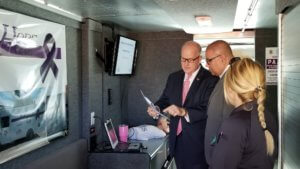Morris County Sheriff's Office Hope One Mobile Addiction Resource and Recovery Program Marks Its Three-Year Anniversary
Published on April 02, 2020
The Morris County Sheriff's Office Hope One mobile substance abuse resource and recovery program is marking its third anniversary on April 3, with a full commitment to resuming community stops once the COVID-19 healthcare crisis subsides and social distancing mandates are lifted.
 Morris County Sheriff James M. Gannon and a Hope One team celebrate reaching 10,000 contacts on New Year's Eve of 2019.
Morris County Sheriff James M. Gannon and a Hope One team celebrate reaching 10,000 contacts on New Year's Eve of 2019.
The Hope One team “ which has made 10,695 contacts since the mobile program launched on the Morristown Green on April 3, 2017 “ temporarily suspended physical stops in Morris County as of March 20.
While the distinctive purple and white Hope One vehicle is not on the road, its team, overseen by Morris County Sheriff's Office Corporal Erica Valvano, is active and communicating electronically and by telephone with individuals struggling with substance abuse and mental health disorders. Anyone in need of a Narcan kit may also contact the Hope One program and a Hope One team member will make a safe, no-contact delivery.
A Hope One partner, the Center for Addiction Recovery, Education & Success (CARES), has not ceased being a tremendous resource during the outbreak, as its staff and Certified Peer Recovery Specialists have been providing telephone and virtual recovery support and delivering life-saving NARCAN kits upon request.
 Morris County Sheriff James M. Gannon aboard Hope One.
Morris County Sheriff James M. Gannon aboard Hope One.
- Individuals in need of recovery and support services or Narcan kits can reach out to CARES at 973-625-1143 every day, 24 hours a day.
- A second Hope One partner, the Mental Health Association of Essex and Morris (MHAEM), can be reached at 973-334-3496.
- The MHAEM peer-to-peer support line at 1-877-760-4987 is available from 5 p.m. to 10 p.m., seven days a week. Other numbers to call are 1-866-445-3902 and 1-800-381-2059.
- The MHAEM has added special daytime hours from Monday through Friday during the COVID-19 pandemic to help people relieve anxiety and feelings of isolation. Call 1-877-760-4987 between 11 a.m. and 2 p.m.
- Individuals in need of housing assistance can call 2-1-1.
- The Hope One coordinator can be reached at 973-590-0300.
I want to thank all Hope One's tremendous partners for saving and transforming lives over the past three years by assisting people into detox and recovery programs, training individuals on Narcan, and guiding others to mental health programs, Morris County Sheriff James M. Gannon said.
We are in the midst of the COVID-19 pandemic right now, which is the priority. But Hope One teams are still here to help, listen, guide and reassure people that the crises of heroin and opioid addiction and mental health disorders are not forgotten, Sheriff Gannon said.
The Morris County Sheriff's Office Hope One program is joined by additional partners: Daytop NJ and the Morris County Department of Human Services.
Since its launch, Hope One teams that include Corporal Valvano or another Sheriff's Officer in plainclothes, a Certified Peer Recovery Specialist and a Mental Health Specialist have made 407 twice-weekly stops in the community. They have trained 2,306 people in the use of Narcan, assisted 166 people into rehab and recovery programs and another 136 people with mental health concerns.
Beyond its stops, Hope One teams assisted the city of Newark, Cape May, Monmouth, Atlantic and Burlington counties with establishing their own Hope One programs. They have advised officials in Hudson and Somerset counties on launching their own mobile recovery programs, and fielded calls about creating similar programs from officials in Pennsylvania, Yonkers, New York, Onslow County, North Carolina, and the city of Boston.
Hope One teams routinely attend and provide critical information at festivals and public gatherings and have trained multiple groups in the administration of Narcan, including lifeguards and County College of Morris students.
We want all Hope One clients and the people who have come to know and trust us, or stop to pick up a cup of coffee or essential toiletries from us, that we are thinking of them and are available by phone, right now, if they need us, Corporal Valvano said.